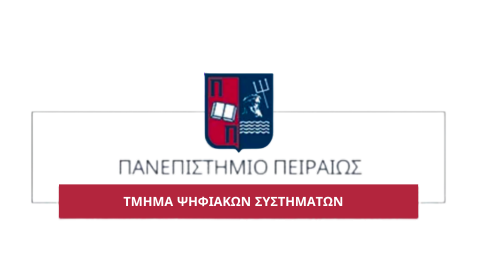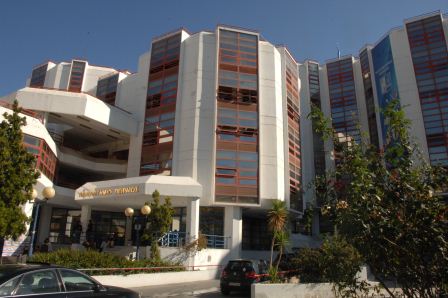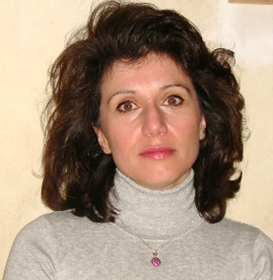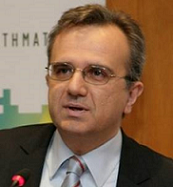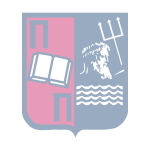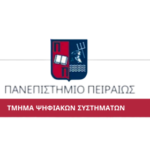Department of Digital Systems
27 January 2024 2024-01-28 19:07Department of Digital Systems
Contact Information:
Address: 80 Karaoli & Dimitriou Str., 185 34, Piraeus
Email: gramds@unipi.gr
Phone: +30 210 414-2369, -2076, -2426, -2373, -2235
Message from the Department Chair of the Department of Digital Systems
The Department Chair would like to welcome you to the official website of the Department of Digital Systems of the University of Piraeus. The main aim of this website is to inform all interested parties in the academic, research and development activities of our Department.
The department covers (through the curricula and the conducted academic research) important areas of the widely and rapidly developing field of Digital Systems and ICT. Specifically, the department’s curricula and research cover the areas of digital/network services, big data processing, artificial intelligence, biomedical and health informatics, broadband (wireless and optical) networks, e-learning and educational technology as well as the techno-economical management and security of digital systems.
The department’s Undergraduate Programme lasts eight semesters (4 years) and is divided into the following areas of study: the “Telecommunications & Networks” (T&N) area, the “Software & Data Systems” (SDS) area, the “Computational Infrastructures & Services” (CIS) area, the “Security” (SEC) area and the Teaching Qualification (ICT) area. The programme awards 240 European Credit Transfer and Accumulation System (ECTS) credits and is designed to prepare scientists who can successfully deal with the complex issues of developing, implementing and managing systems and services of modern technology. Additionally, the Department’s graduates are fully vested to work in the Greek Public Sector, in Computer Science.
The Department of Digital Systems offers ten Postgraduate Programmes:
- The Postgraduate Programme in “Information Systems & Services” leads to a Master’s Degree (M.Sc.) of 90 ECTS credits in one of the following areas of study:
- Advanced Information Systems
- Big Data and Analytics
- IT Governance
- The Postgraduate Programme in “e-Learning” leads to a Master’s Degree (M.Sc.) of 90 ECTS credits in the area of study “e-Learning”.
- The Postgraduate Programme in “Digital Communications & Networks” leads to a Master’s Degree (M.Sc.) of 90 ECTS credits in the area of study “Digital Communications & Networks”.
- The Postgraduate Programme in “Digital Systems Security” leads to a Master’s Degree (M.Sc.) of 90 ECTS credits in the area of study “Digital Systems Security”.
- The Postgraduate Programme in “Techno-economic Management of Telecommunication Systems” leads to a Master’s Degree (M.Sc.) of 90 ECTS credits in the area of study “Techno-economic Management of Telecommunication Systems”.
- The Postgraduate Programme in “Law and Information and Communication Technologies” leads to a Master’s Degree (M.Sc.) of 90 ECTS credits in the area of study “Law and Information and Communication Technologies”.
- The Postgraduate Programme in “Climate Crisis and Information and Communication Technologies” leads to a Master’s Degree (M.Sc.) of 90 ECTS credits in the area of study “Climate Crisis and Information and Communication Technologies”.
- The Department of Digital Systems participates in the Inter – University Postgraduate Programme “Health Care Management – Health Informatics”.
- The Department of Digital Systems participates in the Inter – University Postgraduate Programme “Digital Health and Analytics”.
- The Department of Digital Systems participates in the Inter – University Postgraduate Programme “Artificial Intelligence”.
The Department also offers the opportunity to all qualified graduates of recognized Greek or foreign Universities to conduct research that leads to a Ph.D.
The Department hosts the following research laboratories: “Network-Oriented Systems & Services ”, “Digital Health Services”, “Telecommunication Networks & Integrated Services”, “Systems Security”, “Telecommunication Systems”, “Media Technologies and Intelligent Systems (METIS)”, “Artificial Intelligence” and “Computational Biomedicine”. All of them are active at the National and International levels.
Enjoy your surfing!
The Department Chair
Professor George Efthymoglou
The mission of the Department of Digital Systems is to train young scientists in cutting-edge technologies across different fields of study in information systems, software engineering, data analytics, artificial intelligence, telecommunications, networks, cybersecurity and privacy, computational biomedicine, multimedia, and digital technologies in education and governance. The Undergraduate Program of Studies (POC) aims to create skilled scientists capable of contributing to the development, implementation and management of modern digital technology systems through the acquisition of knowledge as well as the development of critical thinking and skills such as teamwork, time management, and interpersonal communication. These skills combined with specialized knowledge in cutting-edge technologies give our graduates the necessary skills for future success in the professional sector.
Learning Objectives and Skills
The Department of Digital Systems has the mission to train young scientists in cutting-edge technologies that belong to different fields of study and concern information systems, software technology, data analysis, artificial intelligence, telecommunications, networks, cyber security and privacy, computational biomedicine, multimedia, and digital technologies in education and governance. The Undergraduate Study Programme aims to create specialized scientists capable of contributing to the development, implementation and management of modern digital technology systems, as well as to educate them in developing critical thinking, expressing themselves accurately, and theoretical thinking.
The learning objectives of the programme include the acquisition of knowledge and understanding of the technologies involved in creating software, telecommunications hardware, and network services, the familiarization of students with algorithms and complexity, internet protocols and network management, the implementation of applications and services, as well as their familiarization with risk analysis and management methodologies to design and develop secure systems. The laboratory courses aim to help students delve into programming, operating systems, databases, and the design and simulation of telecommunication networks and systems. Upon completion of the undergraduate programme, students will be able to analyze and evaluate the requirements of a system as well as set specifications and design integrated solutions. Laboratory courses and homework assignments aim to help students with the design and implementation of online applications and telecommunications systems, databases, the use of cloud computing methods, signal and image processing, network and information system security and applications using methods of artificial intelligence.
The students of the Department acquire skills and knowledge about the low-level intricacies of computer and operating systems, learn to analyze, design, implement and evaluate software applications based on the principles of procedural and object-oriented programming languages, analyze and design relational databases, utilize and evaluate database management systems and their components, apply development methodologies for information systems, possess theoretical knowledge of data structures and have the ability to implement structures in software under specific functional and non-functional requirements, understand the operation and performance evaluation of network and internet protocols, understand the principles of electromagnetic wave propagation and antenna types, design and obtain the performance of wireless terrestrial and satellite links as well as broadband telecommunications systems, create digital learning systems and develop educational software applications, as well as being able to choose appropriate security measures so that systems and services are protected from possible malicious actions and attacks.
Students’ professional privileges
- The Undergraduate Studies Programme is designed to prepare scientists capable of successfully coping with complex design, development and implementation problems of modern digital technology. Graduates of the Department have already staffed IT and telecommunications companies in the public and private sectors, both in Greece and abroad, as well as educational organizations. Also, many of our graduates follow the research path both in Greece and abroad.
- Qualifications for appointment as IT in positions in public sector bodies (P.D. 347/2003, Government Gazette 315/A’/31-12-2003)
- Qualifications for appointment as Information Technology, Secondary Education Teaching Staff of the Ministry of National Education and Religious Affairs (P.D. 268/2004, Government Gazette 268/A’/28-12-2004)
- Professional Qualification of Graduate Engineers and Graduates of University Education in the fields of Information Technology and Telecommunications (P.D. 44/2009, Government Gazette 58/8-4-2009
- Pedagogical competence
- According to paragraph 2(b) of article 66 (Transitional Provisions) of Law 4589/2019, Government Gazette 13/A’/29-1-2019, “(b) Those who were admitted during the academic years 2013- 2014 and 2014-2015 to teacher training colleges, as defined in par. 2013 and 2013, as defined in article 8, paragraph 2 of article 8 of Law No. 3194/2003 (A΄267)”, those admitted to the Department of Digital Systems, until the academic year 2014-15, are not subject to the provisions of paragraphs 3 and 4 of Article 54.
- Granting of a certificate of pedagogical competence to graduates of the Department admitted up to the academic year 2023-24
According to the 11/04/2019 decision of the Assembly of the Department of Digital Systems and the 13/05/2019 decision of the Senate of the University of Piraeus, regarding the acquisition of basic pedagogical and teaching theoretical training and practical training in the Special Subject (PE86, Computer Science) from the undergraduate curriculum of the Department of Digital Systems, the following applies:
- A new horizontal track is created, entitled Pedagogical and Teaching Competencies (PTI), with nine (9) courses (one (1) Core and eight (8) Elective).
- The titles of three (3) existing courses, which were included in the PTI Direction, are modified in order to reflect more accurately the course content. The mapping to the previous titles is as follows:
- The course of the 6th-semester entitled “Applications of Digital Media in Education” is renamed to “Educational Technology”
- The 7th-semester course entitled “Educational Design” is renamed to “Educational Design STEM”
- The course of the 8th-semester entitled “Teaching of Digital Technologies” is renamed to “Teaching of Informatics” 3) Graduates who have successfully completed and passed six (6) courses (1 Core and 5 Elective), for a total of 30 ECTS (6*5)
- Students are allowed to choose additional courses in each semester from the 5th to the 8th semester for courses from different directions to be available. Consequently, students are allowed to select and take more courses than are strictly necessary for the degree, adding the rest to the diploma supplement.
- The choice of courses to be included in the final degree grade will not be related to the possible acquisition of proficiency but will be decided by the student with a declaration to the Department’s Secretariat.
Quality Assurance
Quality Policy
The Department of Digital Systems recognizes quality as a key means of achieving an excellent level of academic and research work. Staff and students develop activities that are consistent with the quality policy of the Department and in line with the values and goals of the University of Piraeus.
The Digital Systems Department’s Quality Policy expresses the terms and states the Department’s commitment to ensure the quality of its programs, as well as its overall performance, in line with the international requirements for higher education quality. The Quality Policy applies to all members of the academic community of the Department including parties who in any way cooperate, assist and are affected by the quality of the Department’s work and results.
DECLARATION OF QUALITY POLICY OF THE DEPARTMENT OF DIGITAL SYSTEMS
In view of the above, the Department of Digital Systems is committed to implement a Quality Policy that defines specific goals, means and processes of quality, evaluation and continuous improvement, supporting its academic profile, orientation and goals of its curricula, the development of its human resources (staff and students), the development of its research action, and the development of innovation, reinforcing its interconnection with international bodies and with the local community.
To implement this Policy, the Digital Systems Division commits to implement quality processes that ensure:
- (a) The appropriateness of the structure and organization of curricula
- (b) The pursuit of learning outcomes and qualifications in accordance with the European and National Higher Education Qualifications Framework
- (c) The promotion of the quality and effectiveness of teaching work
- (d) The relevance of the qualifications of the teaching staff to its targeted outcomes and goals
- (e) The promotion of the quality and quantity of the research work of the academic unit members
- (f) The interconnection between teaching and research
- (g) The graduates meet the labor market expectations
- (h) The quality of support services, such as administrative services, libraries and student care services
- (i) The conduct of the annual review and internal audit of the quality assurance system in cooperation of the Internal Evaluation Groups with the University of Piraeus Quality assurance Unit and the Quality Assurance & Accreditation Authority for Quality in Higher Education.
Certification
The Department of Digital Systems’ Undergraduate Programme of Studies was accredited by the National Authority for Higher Education in 2019. Accreditation is a quality assurance process carried out on the basis of specific, predefined, internationally accepted and pre-published quantitative and qualitative criteria and indicators, aligned to the Principles and Guidelines for Quality Assurance in the European Higher Education Area (ESG 2015).
The purpose of the accreditation of a curriculum is to ensure the quality of higher education, as well as the efficiency and transparency of the overall operation of Higher Education Institutes.
The conclusions of the committee that conducted the assessment are very positive for the department, praising the painstaking efforts of all its stakeholders and at the same time offering motivation to continue operating at even higher levels of quality and productivity.
An excerpt of the conclusions included in the report of the external evaluation and accreditation committee is provided for illustrative purposes:
The Department closely adheres to the institutional principles (set by the University) which govern the collection of data regarding students, teaching staff, course structures, annual monitoring, assessments, progression, and completion rates.
The Department makes good use of the research funding it receives by equipping the labs to a very high standard, despite the obvious space restrictions, which affect virtually all campuses located in the centre of large capital cities.
The undergraduate program has adopted a wide range of modes of delivery (lectures, practicals, labs) and assessment methods (written and oral examinations, intermediate exercises, practical laboratory assessment, and coursework). Assessment criteria and methods are communicated at the beginning of each course electronically and during the first lecture.
The research activities of the academic staff are clearly one of the strengths of the department, as evidenced by the number of publications in high-quality journals and reputable conferences, the high number of citations, as well as research income and participation in prestigious European research projects (Horizon 2020).
The Department of Digital Systems in Numbers
| Faculty | 23 |
| Postgraduate Programmes | 10 |
| Research laboratories | 10 |
| Papers in peer-reviewed journals | 1.039 |
| Papers in Conference Proceedings | 1.923 |
| Patents | 17 |
| International awards and distinctions | 61 |
| Citations | 69.829 |
| Research Projects (National & European) | 31 |
| IT projects by companies and organizations | 52 |
| External project partners | 118 |
Undergraduate Studies
The Department of Digital Systems of the University of Piraeus was founded in 1999 and covers two important fields:
- Network-Oriented Systems and Services
- Telecommunication Systems and Networks
The transition to the Society of Information requires the emergence of skilled scientists capable of contributing to the development, implementation and management of modern digital technology systems.
On this basis, the Undergraduate Programme of Studies of the Department provides the following majors of study are available:
- Major in “Telecommunications & Networks” (T&N)
- Major in “Software & Data Systems” (SDS)
- Major in “Computational Infrastructures & Services” (CIS)
- Horizontal Major in “Security” (SEC)
- Horizontal Major in “Teaching Qualification” (ICT)
The Department of Digital Systems offers a four-year Undergraduate Programme of Studies which corresponds to 240 credits of the European Credit Transfer and Accumulation System (ECTS) and awards, upon successful completion, a Bachelor’s degree in “Digital Systems”.
Postgraduate Studies
The Department of Digital Systems offers the following Postgraduate Study Programmes (MSc):
- Postgraduate Programme in “Information Systems & Services”
This is a postgraduate programme leading to a Master’s Degree (M.Sc.) of 90 ECTSs in one of the following areas of study:- Advanced Information Systems
- Big Data and Analytics
- IT Governance
- Postgraduate Programme in “e-Learning”
This is a postgraduate programme leading to a Master’s Degree (M.Sc.) of 90 ECTSs in the area of study “e-Learning”. - Postgraduate Programme in “Digital Communications & Networks”
This is a postgraduate programme leading to a Master’s Degree (M.Sc.) of 90 ECTSs in the area of study “Digital Communications & Networks”. - Postgraduate Programme in “Digital Systems Security”
This is a postgraduate programme leading to a Master’s Degree (M.Sc.) of 90 ECTSs in the area of study “Digital Systems Security”. - Postgraduate Programme in “Techno-economic Management of Telecommunication Systems”
This is a postgraduate programme leading to a Master’s Degree (M.Sc.) of 90 ECTSs in the area of study “Techno-economic Management of Telecommunication Systems”. - Postgraduate Programme in “Law and Information and Communication Technologies”
This is a postgraduate programme leading to a Master’s Degree (M.Sc.) of 90 ECTSs in the area of study “Law and Information and Communication Technologies”. - Postgraduate Programme in “Climate Crisis and Information and Communication Technologies”
This is a postgraduate programme leading to a Master’s Degree (M.Sc.) of 90 ECTSs in the area of study “Climate Crisis and Information and Communication Technologies”. - Inter-University Postgraduate Programme “Health Care Management – Health Informatics”
The Department of Digital Systems participates in the Inter – University Postgraduate Programme «Health Care Management – Health Informatics». - Inter-University Postgraduate Programme in “Digital Health and Analytics”
The Department of Digital Systems participates in the Inter – University Postgraduate Programme “Digital Health and Analytics”. - Inter – University Postgraduate Programme in “Artificial Intelligence”
The Department of Digital Systems participates in the Inter – University Postgraduate Programme “Artificial Intelligence”.
PhD Studies
The PhD studies of the Department lead to the award of a PhD degree in the following general research areas:
- Network-Oriented Systems and Services
- Digital Health Services
- Telecommunication Networks and Integrated Services
- Security Systems
- Intelligent Systems and Multimedia Technologies
- Telecommunication Systems
- Technology – Enhanced Learning
The preparation of a Doctoral Dissertation (D.D.) is governed by the relevant provisions and aims to create scientists capable of contributing to the progress of science through high-quality scientific research. Holders of a Master’s Degree (M.Sc.) are eligible to apply for a doctoral thesis. In exceptional cases, non-Masters degree holders may be admitted as doctoral candidates (Ph.D.).
Candidates for a doctoral thesis must have at least the following qualifications: (a) A degree or diploma from a higher education institution in Greece or an equivalent foreign degree recognised by the I.O.A.T.A.P., and (b) A certificate of sufficient knowledge of English. Foreign candidates must have an adequate knowledge of Greek.
Post-doctoral Studies
The Department of Digital Systems of the University of Piraeus offers the possibility of postdoctoral research by PhD students from either Greek or foreign universities in collaboration with faculty members of the Department.
Post-doctoral research within the Department is a source of collective excellence, high-level scientific collaboration and international distinction for the Department and the University in general. In these ways, postdoctoral research contributes to the quantitative and qualitative upgrading of research in the Department and to the transfer of know-how in new and dynamic research fields for the benefit of society and the national economy.
LLP - Erasmus
The Department’s bilateral agreements with European Universities in the framework of LLP – Erasmus are listed below:
European Universities for the Postgraduate Studies Programme (MSc)
- Telecom SudParis (France)
- Plymouth University (England)
- University of Surrey (England)
- University of Greenwich (England)
- Universidad Politecnica de Catalunya (Spain)
- University of Malaga (Spain)
- KU Leuven (Belgium)
- Universitat Regensburg (Germany)
- Sapienza Universita di Roma (Italy)
- Politecnico di Milano (Italy)
- Universita degli Studi di Milano (Italy)
- Universita degli Studi di Trento (Italy)
- University of Groningen (Netherlands)
- University of Vienna (Austria)
European Universities for the Undergraduate Programme of Studies (BSc)
- University of Cyprus
- Universidad de Granada (Spain)
- KU Leuven (Belgium)
- University of London (England)
- University of Craiova (Romania)
- West Pomeranian University of Technology (Poland)
- University of Valladolid (Spain)
- Stockholm University (Sweden)
- Universitat Regensburg (Germany)
- Afyon Kocatepe University (Turkey)
- Universitatea Politehnica din Timisoara (Romania)
- Warsaw Management Academy (Poland)
The coordinator of the Department of Digital Systems for Erasmus is Professor Apostolos Meliones.
More information about the Erasmus Lifelong Learning Programmes can be obtained from the International Relations Office of the University of Piraeus (Main Building, 4th floor, telephone (+30) 2104142245) and from http://erasmus.unipi.gr/.
Network-Oriented Systems and Services Lab
Artificial Intelligence Lab
Telecommunications Systems Lab
Systems Security Lab
Telecommunication Networks and Integrated Services Lab
Computational Biomedicine Lab
Media Technologies and Intelligent Systems Lab
Digital Health Serivces Lab
Information Technology and Communications Digital Learning & Digital Education Lab
Systems and Policies for Environment and Energy Lab
Associate Professors
Assistant Professors
| Full name | Rank | |
| Marinos Themistocleous | Professor | mthemist@unipi.gr |
| Flora Malamatainiou | Professor | flora@unipi.gr |
| Vera Alexandra Stavroulaki | Professor | veras@unipi.gr |
| Full name | Rank | |
| Georgios Vasilacopoulos | Professor | gvass@unipi.gr |
| Socratis Katsikas | Professor | ska@unipi.gr |
| Full name |
| Gallos Parisis |
| Georgiou Dimitra |
| Gotsis Antonis |
| Diamantopoulou Vasiliki |
| Dragonas Evangelos |
| Zarras Apostolos |
| Theodorou Paraskevi |
| Kiourtis Athanasios |
| Koufi Vassiliki |
| Lyvas Christos-Giasser |
| Malliatsos Konstantinos |
| Marantis Leonidas |
| Mavrogiorgou Argyro |
| Politis Ilias |
| Santipantakis Giorgos |
| Stilios Ioannis |
| Melliou Kyriaki |
| Menichtas Andreas |
| Michailidis Emmanouil |
| Petropoulou Urania |
| Farao Aristeidis |
| Full name |
| Alexiou Ekaterini |
| Altanis Ioannis |
| Anastopoulos Vassilios |
| Vavousis Konstantinos |
| Georgioopoulou Zafeiroula |
| Georgiou Dimitra |
| Goudosis Athanasios |
| Dragonas Evangelos |
| Theodorou Paraskevi |
| Kallipolitis Athanasios |
| Katelaris Leonidas |
| Kiourtis Athanasios |
| Kontogianni Georgia |
| Kofinas Panagiotis |
| Lyvas Christos-Giasser |
| Makri Eleni-Laskarina |
| Makridis Georgios |
| Malliaros Stefanos |
| Margaris Aristotelis |
| Mavrogiorgou Argyro |
| Mihota Alexandra |
| Belikaidis Ioannis-Prodromos |
| Bountakas Panagiotis |
| Mykoniati Maria |
| Mysirlaki Sofia |
| Nicolaides Victor |
| Stagias Ioannis |
| Full name |
| TOTOW TOM ATA JEAN DIDIER |
| ANGELLOGIANNI ANNA |
| ANGELOPOULOU JULIETA |
| ALAFOUZOU ANGELIKI |
| ALEXANDRIDIS THEODOSIOS-GEORGIOS |
| ALOIZOY VALERIA |
| AMERICANOS PARIS-PANAGIOTIS |
| ARMENIANAKOS CHARALABOS |
| VIDALIS SOULAS IOANNIS |
| VINACHELLA DIMITRA |
| BOUDOURIS ANASTASIOS |
| VOUZIS ELEFTHERIOS |
| GIAPANTZIS KONSTANTINOS |
| GOLIAS CHRISTOS |
| GOUNTOUMA MARIA |
| GLENIS APOSTOLOS |
| GRAMMATOPOULOS ATHANASIOS-VASSILEIOS |
| DARDANIS DEMETRIOS |
| DARRA ELENI |
| DEMETRIOU KYRIAKOS |
| DRIVAS GEORGIOS FRANGOS |
| DRITSA ALEXANDRA |
| ZAFEIROPOULOS NIKOLAOS |
| KARAGIANNIS GEORGIOS |
| KARAISKOU VASSILIKI |
| KARABA VASSILIKI |
| KARABELAS ANDREAS |
| KARASTATHIS RENOS |
| KARVOUNAS DEMETRIOS |
| KLEFTAKIS SPYRIDON |
| KOUKOURIKOS ANTONIOS |
| KOULOURIS DIONYSIOS |
| KOUMENTIS IOANNIS |
| KOUTROUMANIS NIKOLAOS |
| KOUTROUMPOUCHOS NIKOLAOS |
| KRAVARIS THEOCHARIS |
| LALOU STAVROULA |
| LYNARDATOU STAYROULA |
| MANIAS GEORGOS |
| MAVROGIANNIS PANAGIOTIS |
| MAVROGIORGOS KONSTANTINOS |
| MENEGATOS ANDREAS |
| MICHALOLIAKOS MICHAEL |
| MOUGIAKOU SOPHIA |
| BALASKAS GEORGIOS |
| MPAMPATSIKOS MICHAEL |
| MPASTAS ALEVIZOS |
| MPOLGOURRAS VAIOS |
| MPOLOUDAKIS MICHAEL |
| MYLONAS EVANGELOS |
| NEOFOTISTOU ELENI |
| NIKITOPOULOS PANAGIOTIS |
| ECONOMIDOU EUDOKIA |
| ECONOMOU EUTHYMIOS |
| PAPADOPOULOS GEORGIOS |
| PAPARIS GEORGIOS |
| PAPASOTIRIOU EVANGELOS |
| PARASKEVOULAKOU EFTERPI |
| PARDOS ANTHONIOS |
| PATERGIANAKIS ANTONIOS |
| PAULOPOULOS ADRIANOS |
| PETRATOS DIMITRIOS |
| POULAKIS IOANNIS |
| RAPTIS ANASTASIOS |
| RONTOU KALLIOPI |
| SIAPERA MARIA |
| SKIADAS PETROS |
| STAMBERNAS SOTIRIOS |
| STAUROU NIKOLAOS |
| STRATIDAKIS GEORGIOS |
| STYLIANOU IOANNIS |
| SFAKIANAKIS KONSTANTINOS |
| SYMVOULIDIS CHRYSOSTOMOS |
| TZIOMAKA-ANASTASAKI MELINA-ELEINE |
| TSEKENIS VASSILEIOS |
| TSIGKRIS ANDREAS |
| TSILIGKOS KLEOMENIS |
| FARAO ARISTIDES |
| FATOUROS GEORGIOS |
| FILIOS CONSTANTINOS |
| FRANGIADAKIS IOANNIS |
| HASSIOTOU SULTANA |
| CHELMI MARIA-NEFELI |
| CHITOS ANDREAS |
- Department of Digital Systems – Secretariat
The building of the Secretariat of the Department is located in Piraeus at 80-82 Zeas Street (2nd floor). The Secretariat of the Department serves undergraduate students every Monday-Wednesday-Friday from 11:30 – 14:00.
Address: University of Piraeus | Zeas 80-82, 185 34 Piraeus | Floor: 2nd | email: gramds@unipi.gr | Fax: 210-4142376
The Secretariat of the Department of Digital Systems consists of five members:
| Full name | Office | Telephone | |
| Antoniou Paraskevi (Head Secretariat) | Zeas 80-82 (2nd floor) | 210-4142235 | panton@unipi.gr |
| Skountzou Sofia | Zeas 80-82 (2nd floor) | 210-4142373 | sskountz@unipi.gr |
| Frentzas Ioannis | Zeas 80-82 (2nd floor) | 210-4142426 | fretzas@unipi.gr |
| Plevritaki Anna | Zeas 80-82 (2nd floor) | 210-4142076 | anplevritaki@unipi.gr |
| Theodoropoulos Panagiotis | Zeas 80-82 (2nd floor) | 210-4142369 | ptheodor@unipi.gr |
- Secretariat of the President
The President’s Secretariat serves only matters concerning the Chair of the Department of Digital Systems and faculty members of the Department.
Address:University of Piraeus | 150 Odyssea Androutsou, 185 32 Piraeus | Floor: 5th | Tel: 210 4142751, 210 4142752 | Fax: 210 4142753
The members of the Presidential Secretariat are:
| Full name | Office | Telephone | |
| Katerina Poupouza | Odyssea Androutsou 150, 185 32 Piraeus (5th Floor) | 210-4142752 | kpoupou@unipi.gr |
Research Areas
- Antenna technologies & smart antennas
- Artificial Intelligence - Machine Learning
- Assistive technologies in special education
- Augmented and Virtual Reality in Education
- Big Data
- Bio-informatics
- Biomedicine Engineering and Technology
- Broadband transmission techniques
- Cloud Computing
- Data Mining
- Design and simulation of dynamic spectrum assignment algorithms for cellular networks
- Digital communication systems
- Digital signal processing for telecommunications
- Distributed Systems
- E-commerce
- Edge Computing
- Energy-efficient fixed and mobile network infrastructure
- Health Information Systems
- Information Systems
- Information and Communication Technologies in Education and Learning
- Intelligent Agent Systems
- Intelligent/cognitive/autonomous management
- Internet of Things (IoT)
- Knowledge Management in Health Care
- Microwaves and transmission lines
- Mobile communication systems
- Multimedia Technologies
- Predictive analyses
- RF system design and development
- Satellite communication systems
- Semantics Web in Health
- Service-Oriented Architectures
- Signal propagation
- Smart Cities
- Smart Energy
- Smart Networks
- Software Defined Networks (SDN)/Network Function Virtualisation (NFV)
- Software Engineering
- Software design/development/experimentation
- System security
- Technology-Supported Health User Education
- Wearable Devices
- Wireless and mobile broadband networks 5G, 6G
- Wireless communication systems
- e-Governance
- e-Health
Research Activity
Research laboratories | 10 |
Papers in peer-reviewed scientific journals | 1.039 |
Papers in peer-reviewed conference proceedings | 1.923 |
Patents | 17 |
International awards and distinctions | 61 |
Citations | 69.829 |
Research projects (National and European) | 31 |
Quality of research
The Department’s quality of research is reflected in the quality of the scientific journals published by its members, its Ph.D. students and post-doctoral researchers, and the number of activities devoted to research. The quality of research also leads to high-quality teaching.
Publications
Professors
| Full name | Publications link |
|---|---|
| Angeliki Alexiou | Digital Library for Computer Science Research - DBLP |
| Georgios Vouros | |
| Stefanos Gritzalis | |
| Panagiotis Demestichas | |
| Georgios Efthymoglou | |
| Athanasios Kanatas | |
| Dimosthenis Kyriazis | |
| Konstantinos Lambrinoudakis | |
| Ilias Maglogiannis | |
| Christos Xenakis | |
| Adriana Prentza | |
| Simeon Retalis | |
| Angelos Rouskas | |
| Dimitrios Sampson | |
| Nikitas-Marinos Sgouros | |
| Ioannis Maniatis | |
| Apostolos Meliones | |
| Fotini Paraskeva | |
| Michael Filippakis |
Associate Professors
| Full name | Publications link |
|---|---|
| Maria Chalkidi | |
| Christos Doulkeridis |
Assistant Professors
| Full name | Publications link |
|---|---|
| Andreas Menichtas | |
| Orestis Telelis |

